Unit6 i'm going to study computer science 公开课
- 格式:ppt
- 大小:7.28 MB
- 文档页数:42
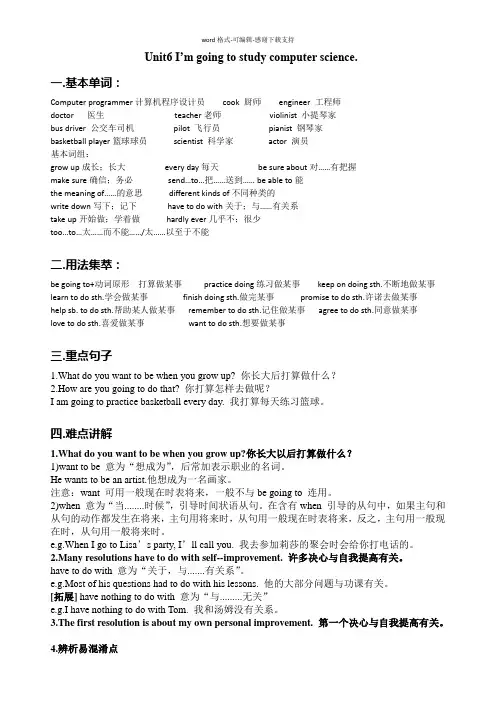
Unit6 I’m going to study computer science.一.基本单词:Computer programmer计算机程序设计员cook 厨师engineer 工程师doctor 医生teacher老师violinist 小提琴家bus driver 公交车司机pilot 飞行员pianist 钢琴家basketball player篮球球员scientist 科学家actor 演员基本词组:grow up成长;长大every day每天be sure about对……有把握make sure确信;务必send…to…把……送到…… be able to能the meaning of……的意思different kinds of不同种类的write down写下;记下have to do with关于;与……有关系take up开始做;学着做hardly ever几乎不;很少too…to…太……而不能……/太……以至于不能二.用法集萃:be going to+动词原形打算做某事practice doing练习做某事keep on doing sth.不断地做某事learn to do sth.学会做某事finish doing sth.做完某事promise to do sth.许诺去做某事help sb. to do sth.帮助某人做某事remember to do sth.记住做某事agree to do sth.同意做某事love to do sth.喜爱做某事want to do sth.想要做某事三.重点句子1.What do you want to be when you grow up? 你长大后打算做什么?2.How are you going to do that? 你打算怎样去做呢?I am going to practice basketball every day. 我打算每天练习篮球。

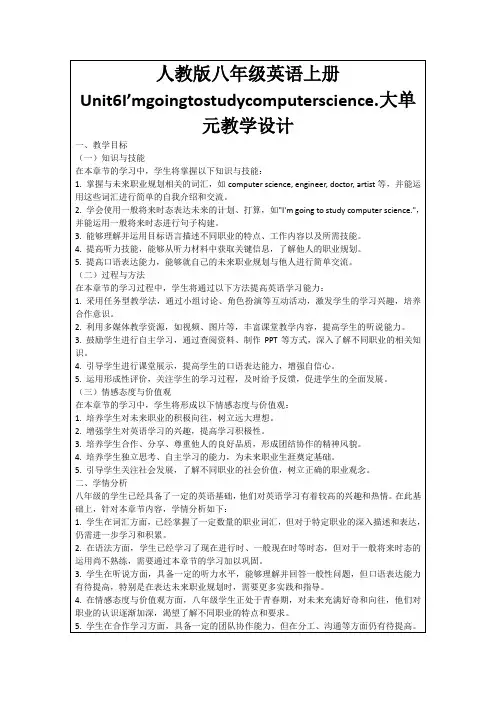


主备课人授课人授课时间:2014 年__月日课题Unit6 I’m going to study computer science.Period 1个人补充栏教学目标知识能力和目标1.学习有关职业的单词。
2.学会谈论自己或他人的理想和以及谈论实现理想的方式。
情感与价值目标循,激情投入,全力以赴完成学习任务,为自己的职业理想而奋斗。
教学重点难点1.学习有关职业的单词2. 学会谈论自己或他人的理想和以及谈论实现理想的方式。
小组合作指导动读记单词、自觉捕捉听力中的关键词、听后跟读、读用重点句型教学准备多媒体教学过程包括教学流程设计、教学重难点突破及学法指导个人补充栏一、导入(启发探究3分钟)A: What do you want to be when you grow up?B: I want to be a basketball player.二、自学(自主探究6分钟)认读并书写本课单词1.个人自读,记忆单词.2.小组互相检查读、写情况.3 .写出下列单词并展示医生工程师小提琴手司机飞行员钢琴家科学家厨师学院4.在小组内核对答案.5.根据自己对各种职业的兴趣,将1a 的单词排序。
教学过程三、交流(合作探究10分钟)学会询问对方的理想和实现理想的方式。
1.听录音完成1b的填空。
2. 让学生理解并复述听力对话. 并和你的同学编新对话.3. 用1a和1b中的信息两人一组练习下面的对话:A: What do you want to be when you grow up?B: I want to be a basketball player.A: How are you going to do that?B: I’m going to practice basketball every day.小组调查:询问他人的理想和实现理想的方式。
姓名理想职业方式Li Xin调查报告:In my group, Li Xin wants to be…. He is going to ….四、总结(引深探究15分钟)1. 总结所学过的有关职业的名词。
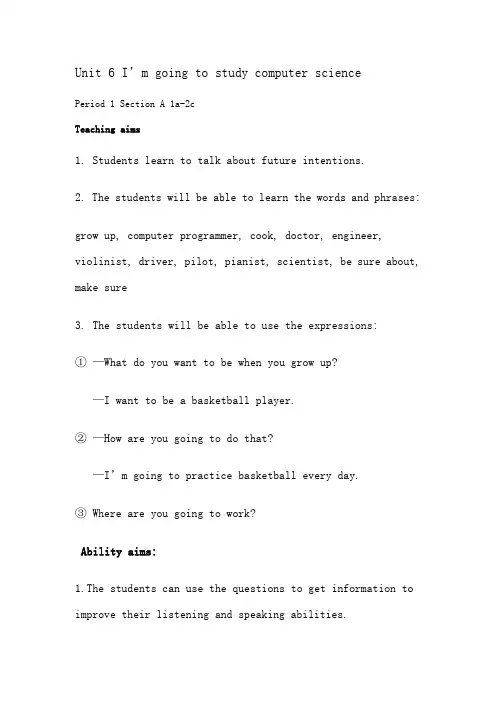
Unit 6 I’m going to study computer sciencePeriod 1 Section A 1a-2cTeaching aims1. Students learn to talk about future intentions.2. The students will be able to learn the words and phrases: grow up, computer programmer, cook, doctor, engineer, violinist, driver, pilot, pianist, scientist, be sure about, make sure3. The students will be able to use the expressions:① —What do you want to be when you grow up?—I want to be a basketball player.② —How are you going to do that?—I’m going to practice basketball every day.③ Where are you going to work?Ability aims:1.The students can use the questions to get information to improve their listening and speaking abilities.2.To train the students’ cooperation with their partners. Key and important difficult points:A. VocabularyB. Target language1. What do you want to be when you grow up?I want to be a computer programmer.2. How are you going to do that?I’m going to study computer science.C. StructuresFuture with going to, Want to be, What, How questionsD. GrammarThe simple future tense.Emotional aims:To help the students to make their future plan and get them to know they should do lots of thing to make their dreams come true.Teaching procedures:Step 1 Warming up.1. GreetingsT: Good morning, boys and girls. How are you ? Are you happy today? I’m really happy that we can have a class here today. First, can you show me your hands, clap it loudly.2. read the chant together.T: Now, let’s read the chant together. Clap your hands and chant together.Doctor doctor she is a doctorActor actor she is an actorTeacher teacher he is a teacherWhat do you want to be ?Cook cook Tom is a cookDriver drive Bob is a driverReporter reporter Jane is a reporterWhat do you want to be ?So what jobs can you see from the chant? Can you tell me? Do you want to know any other jobs? Let’s see together.Step 2 Presentation1. Do you know any other jobs?2. Can you guess these jobs?T: If you know the answer, please stand up quickly. Say it loudly.3. Read the words.Step 3 Work on 1a.1. Read the words.2. Do you think these jobs are interesting? Which job do you think is the most interesting? Which job do you think is the least interesting?3. Students answer.To be a computer programmer is the most interesting. To be a bus driver is the least interesting.Step 4 New language presentation.1. T: What do you want to be when you grow up? When I was a child,I wanted to be a guide. So what about you ? What do you want to be when you grow up?2. Explain “grow up”3.Help Ss to answer it.Then show some more pictures to help Ss learn professions 2. T: Now take out a piece of paper. Think about your dreams and write your dream down on the paper. So what do you want to be when you grow up?4. T: Do you want to make your dream come true? It’s time for us to have a game. “Try your luck.” Take out the paper, fold it. Then try to throw into the box. If you throw into it, your dream maybe come true. Say out your dream loudly. I will call some of you to come to the stage to try your luck, any volunteers? Ask other Ss, let them answer” What does he/she want to be when he/she grows up?”.5. T: But How are you going to do that if you want to be a teacher when you grow up? Let’snswer together. Boys ask girls answer.6. How is she/he going to do that ?Step 5 Pair work.T: Now I want to know something about you ? What do you want to be when you grow up? How are you going to do that ? An example: -What do you want to be when you grow up? --I want to be a/an… --How are you going to do that? --I’m going to…--What does he/she want to be when he/she grows up? --He/She wants to be a/an… --How is he/she going to do that? --He/She is going to…T: Now it’s time for you to talk with your deskmates. One asks and one answers.Step 6 Work on 1b.1. T: We know our plans, do you want to know other Ss’ plans ? Now open your books, let’s see the pictu re, listen to four conversations and answer questions. You should match and fill in the blanks. Now let’s check the answers.2. Check the answers:So in conversation 1, what does the girl want to be ? How is she going to do that?Step 7 Work on 2a.2b. .T: You all know Xiao Wanzi’s story. There is another boy, his name is Cheng Han. he has another story, too.T:Chen Han has a future plan .Listen ,What is Cheng Han going to do? Check the correct boxes in the picture.2.What are Cheng Han’s plans for the fu ture? Fill in the chart.3. Let’s listen together. Let’s check the answers.Step 8 Make a survey.Do you want to know your classmates’ plans. Now let’s make a survey ask your classmates. Three Ss a group. Then choose one Student to make a report here.Step 9 Summarize and homework.1. Today, you have done a very good job.Your dream maybe come true. But remember you should work very hard and take actions, you will be successful.2. Summarize3. homework.Unit6I’m going to study computer science.Period 2 Section A 2d-3cTeaching aims: Knowledge aims:The students will learn the new words: be sure about , make sure , college , education, medicine , university , London, article , send ?The students will go on using the expressions:How are you going to b ecome …? Where are you going to move/ work? When are you going to start?Ability aims:1.The students can use the questions to get information to improve their listening , speaking, reading and writing abilities.2.To train the students’ cooperation with their partners. Emotional aims:The students will share their future plans and talk about how to achieve their dreams.Teaching important points:The students will use the expressions in this period to get the information.Teaching difficult points:The students will make a survey about their future plans and do some writing.Teaching procedures: Step1 Warming up1 .Sing the song . Que , Sara, Sara with the students.3.Tell Ss : Not everyone knows what they want to be!Step 2 Review1 Say the jobs.2. Ss work in pairs and revise the expressions that they learned in Period 1. What do you/they… want to be when you/they… grow up ? Why do you/they… want to be a/an…? How are you/they… going to do that ? Where are you/they… going to move? When are you/they… going to start? Step 3 Presentation.T present the new words and phrases.What is your sister going to become when she grows up ?Step 4 Reading .1. Ss read 2a and answer the questions.What does Ken want to be when he grows up? How is he going to become a writer?What is Andy going to be when she grows up?Step 5 Role play.First let Ss read after the tape and the work in pairs . At last ,role play the conversation.Step 6 Learning and exercises.Ss learn Grammar focus and do 3a and 3b Then check the answers. Step 7 Emotional teaching .Ss will know :Make sure you try your best. You can be anything you want. Bb designPeriod3语法讲解;begoingto的基本用法;1.begoingto是"一般将来时&;其常用用法有以下几种:;二、观察下列句子,总结be goingto结构的句;?比尔打算今年冬天学滑冰;—IsBillgoingtole arnskati;比尔打算今年冬天学滑冰吗??—Yes,heis.;聪明的你看出来了吗?;2.在肯定句中,begoingtobe going to是"一般将来时"的一种表现形式,表示将来某个时间将要发生的动作或存在的状态,意思为"打算,将要",表示将来的打算、计划或安排。
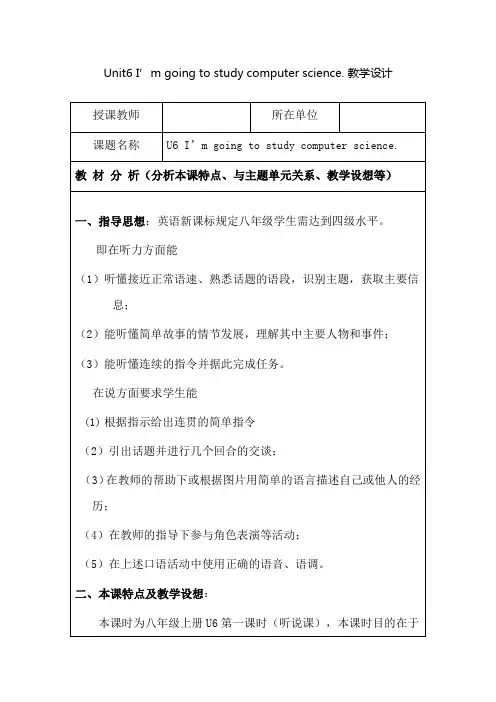
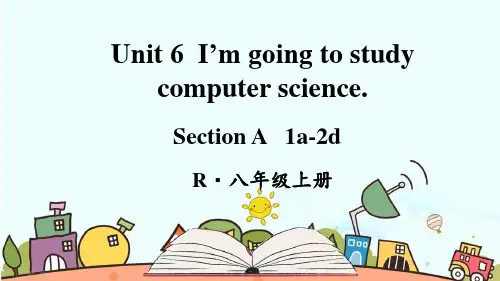
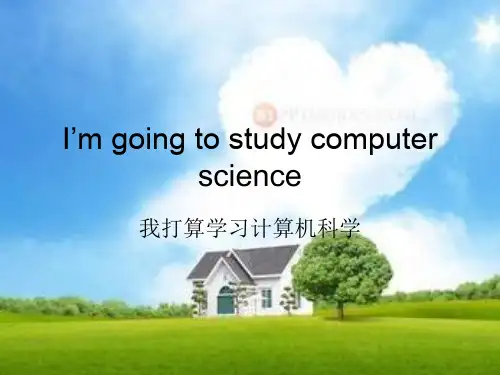
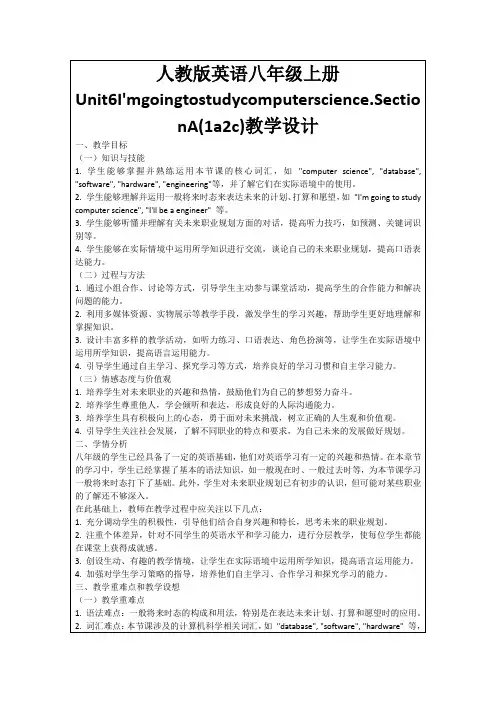
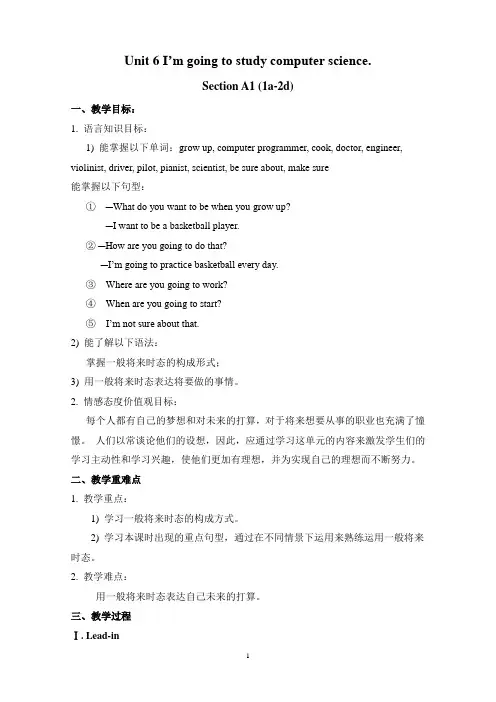
Unit 6 I’m going to study computer science.Section A1 (1a-2d)一、教学目标:1. 语言知识目标:1) 能掌握以下单词:grow up, computer programmer, cook, doctor, engineer, violinist, driver, pilot, pianist, scientist, be sure about, make sure能掌握以下句型:①─What do you want to be when you grow up?─I want to be a basketball player.②─How are you going to do that?─I’m going to practice basketball every day.③Where are you going to work?④When are you going to start?⑤I’m not sure about that.2) 能了解以下语法:掌握一般将来时态的构成形式;3) 用一般将来时态表达将要做的事情。
2. 情感态度价值观目标:每个人都有自己的梦想和对未来的打算,对于将来想要从事的职业也充满了憧憬。
人们以常谈论他们的设想,因此,应通过学习这单元的内容来激发学生们的学习主动性和学习兴趣,使他们更加有理想,并为实现自己的理想而不断努力。
二、教学重难点1. 教学重点:1) 学习一般将来时态的构成方式。
2) 学习本课时出现的重点句型,通过在不同情景下运用来熟练运用一般将来时态。
2. 教学难点:用一般将来时态表达自己未来的打算。
三、教学过程Ⅰ. Lead-in1. 介绍自己小时候想要从事的职业,由此归纳出以前所学过的一些职业的英语表达方式:teacher, nurse, doctor, basketball player, runner, actor, actress…2. 询问学生们想要从事的职业,从而引出句型:─ What do you want to be when you grow up?─ I want to be a basketball player.3. 学生们看幻灯片,引导学生们进行问答自己将来所喜欢的职业。
Unit6I’m going to study computer science一、词性转换1.violin名词(表人)violinist小提琴家2.piano名词(表人)pianist钢琴家3.science名词(表人)scientist科学家4.drive名词(表人)driver司机cation形容词educational有教育意义的6.send过去分词sent7.foreign名词(表人)foreigner8.mean名词meaning9.discuss名词discussion10.begin名词beginning重点讲解:puter programmer bus driver basketball player【拓展】(1)动词后加erlisten→listener听众read→reader读者teach→teacher教师clean→cleaner清洁工sing→singer歌手work→worker工人farm→farmer农夫own→owner主人play→player运动员wait→waiter服务员(2)以e结尾的加rwrite→writer作家dance→dancer舞蹈演员drive→driver驾驶员(3)在动词后加orvisit→visitor参观者invent→inventor发明者act→actor男演员2.violin→violinist;Piano n→pianist【拓展】 -ist是一个名词后缀,加在某些名词或动词后面,可用来表示“从事某种职业的人“piano→pianist science→scientist art→artist艺术家3.I’m going to move to Shanghai.。
【解析】move v移动,搬动move to+地点搬到某地A.pianoB.driverC.pilotD.scientist3.I’m going to move to Shanghai.。
Unit6 I’m going to study computer science.
grow up成长;长大 every day每天 be sure about对……有把握 make sure确信;务必send…to…把……送到…… be able to能 the meaning of……的意思 different kinds of不同种类的
write down写下;记下 have to do with关于;与……有关系 take up开始做;学着做hardly ever几乎不;很少 too…to…太……而不能……/太……以至于不能
be going to+动词原形打算做某事 practice doing练习做某事 keep on doing sth.不断地做某事
learn to do sth.学会做某事 finish doing sth.做完某事 promise to do sth.许诺去做某事help sb. to do sth.帮助某人做某事 remember to do sth.记住做某事 agree to do sth.同意做某事love to do sth.喜爱做某事 want to do sth.想要做某事
be going to的用法。